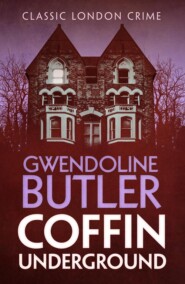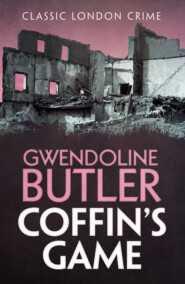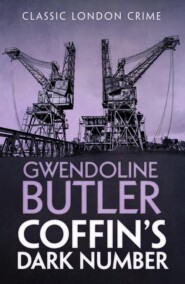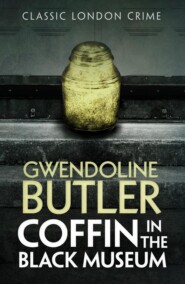По всем вопросам обращайтесь на: info@litportal.ru
(©) 2003-2024.
✖
Coffin on the Water
Автор
Год написания книги
2018
Настройки чтения
Размер шрифта
Высота строк
Поля
‘Nasty.’
‘A lot of suspicion fell on her. But the coroner brought in a verdict of accidental drowning. Didn’t stop the talk, though.’
‘I bet.’
‘And she would never accept that he was dead. Carried on as if he’d come back. Always said he’d be home again. And when he didn’t, and didn’t, she retired to Angel House and hid.’
‘I remember hearing,’ said Tew. ‘It’s coming back to me.’ He thought Rachel Esthart looked calmer and more rational now, as if Banbury had had a good effect.
‘Over the years she’s often been in asking, roughly speaking, if we’ve got him. And of course, we never have. So what’s new this time?’
In a wondering way Harry Tew said: ‘She told me she’d had a card from her son saying he was sending her a present, only it hasn’t come.’
He knew now what it was that was unlucky about the day: it was this visit of Rachel Esthart. It depressed him. Especially with whale steak for supper.
‘She hasn’t been in lately. To tell you the truth I thought she’d given up. Cruel of someone to start her up again like this as a joke.’ Banbury felt angry.
If it was a joke.
The day Stella Pinero arrived in Greenwich was also the day a murder started to grow. Think of murder as a plant that has to have time to grow. Think of this murder as a plant with deep roots. The times get the murders that suit them. These murders were as bang in period as a page-boy hairstyle or a square-shouldered suit.
It is harsh to associate Stella with murder, pretty, charming, ambitious Stella, but the truth is Stella, and that little streak of ruthlessness in her, was integral to the plot. Yet, if it had not been her, one has to say, it might have been another girl. In which case the story would be different, and not the one laid out here. Yet even that may be doubtful. Probably it was all laid out, the way it would go, very early on.
Perhaps, as some philosophers suggest, there are alternative universes in which these murders are not taking place.
Stella Pinero, a young policeman called John Coffin, and another, Alex Rowley, arrived on Greenwich railway station on the same day. It was new boys’ day. Stella Pinero going to the theatre, the two young men to their lodging-house and then on to report to the police station. Never mind it being Sunday. Actresses and policemen travel on Sunday.
One other person got off the train with them, but they were too busy noticing each other to notice him.
It was a cold day in March with a light rain just beginning to fall.
Stella walked up the platform by the side of a porter pushing a trolley with her bags on it; all she owned in the world was in those bags and she had to keep an eye on them. She was aware of the two young men following her, aware that they must be admiring her long, silken legs and hopeful that her stockings didn’t have a ladder in them.
Without a word they hurried their pace so that they were just behind her when the porter deposited her bags. Her name was written in large white letters across the cases so they knew who she was from the beginning. Where she was going also. Theatre Royal, Greenwich, said a large label.
In the street outside an aged hansom cab with an elderly horse was drawn up, with the driver sitting slumped over the reins.
‘I thought there’d be a taxi-cab,’ Stella was saying in a puzzled voice.
‘No taxis, miss. Not since the war. But there’s old John and his horse.’
‘Oh, the poor old horse. I don’t think I could. I think I must be stronger than he is.’
But she had started to shift her bags when a tall, slender man came out of the station and cut across her path, apparently without noticing her, and jumped into the cab. He was driven off.
Stella stood there looking.
‘Well, I’m damned. What cheek.’ John Coffin came forward; this was his chance.
Stella was staring after the cab. ‘It’s Edward Kelly. I saw his face. I don’t suppose he even noticed me.’
Coffin knew the name. He liked the theatre himself. ‘He’s quite a plain chap, too.’
Stella said nothing. She knew all about Edward Kelly’s plainness and what it did to you. Edward was supposed to exercise a kind of droit de seigneur over the junior members of the cast. Might not be true, of course, but she rather hoped it was.
Or did she? She was still a virgin. Well, more or less, she told herself. That is, rather less than more.
Alex picked up one bag, John Coffin the other, and together they walked with her to the theatre which could be seen from the station, lying riverwards.
Stella was friendly to them as they walked, chattering away telling them who she was and what a marvellous chance it was for her to work at the Theatre Royal, Greenwich, at this stage of her career. The Delaneys were real old pros; she was looking forward to working in their company. But Coffin got the clear impression that her thoughts were elsewhere.
Both young men were trained to notice things: John noticed that she was pale beneath her rouge: Alex Rowley noticed that she was stronger than she looked, she had picked up her case quite purposefully and it was exceedingly heavy. One of those frail toughs, he thought sardonically, half attracted, half put off.
The Theatre Royal, Greenwich, had been hit twice in the war, once in the first blitz and once by a buzz-bomb in 1944. Repairs had been kept to a minimum but it had a friendly old face, redolent of cheerful queues, with boxes of chocolates in the stalls and oranges in the pit.
Stella started to mime them a kiss, then changed her mind and delivered a kiss on each young man’s cheek. It was a professional job, leaving no lipstick and hardly to be felt.
‘Thanks, boys. Come around to my dressing-room one night and we’ll have a drink. I don’t know where I’ll be living, the theatre is finding me a place. ‘Bye for now.’
She disappeared into the theatre where they could hear her voice calling out her arrival.
‘Well, that’s her settled. What about us?’
For an answer John Coffin produced a piece of paper from his pocket. ‘Mrs Lorimer, The Regency Hotel, Abigail Crescent. That’s me and, I presume, you too. There’s a map Come on.’
Coffin said he knew a lot about the district, he had a connection.
‘Mate of mine in the army, his dad runs a restaurant there. Vic Padovani.’ Coffin remembered Vic well. A willing man but clumsy, an unlucky soldier. But likeable. ‘We called him Robert Taylor.’ With looks such as his, Vic could get any girl he wanted, and did, but they never stayed with him long. Unlucky. ‘I’ll look him up.’
They walked together up the hill towards Blackheath, not yet friends but ready to like each other, while recognizing they might have to be rivals.
They had met at Morley College, South London, which had been the venue for a special training course for the new intake for the Metropolitan Police, coming straight in from the army. Alex was the one who had wanted to be a dancer. Both John Coffin and Alex Rowley were members of a group specially selected for accelerated promotion. They had done their time on the beat in another part of London, taken the Morley College course, and were now detective-constables sent out, almost like rations, to this part of South Bank London by the river. They knew that there must be a personal file on them in the police archives with observations on their character, intelligence and behaviour. They were both conscious of having covered up something.
Mrs Lorimer’s Private Hotel, over-grandly called The Regency, was part of a terrace of brick houses run up by a speculative builder in 1850 and maintained in dubious repair by successive owners ever since. Bombed in 1940, the hotel had not had a pane of glass in its windows for nearly five years, making do with yellow paper which let in some light but no views. Mrs Lorimer, a tall, grey-haired woman forever in a hurry, had been an air-raid warden and had not lost her air of command. She had personally doused fire-bombs in the great fire-raid of December 1940, remained calm when an unexploded land-mine descended on the roof of a crowded shelter, been awarded the George Medal, and been the scourge and terror of her neighbours.
She felt a certain stigma attached to having a police-constable (even if a detective) in the house. How would Lady Olivia feel? The old girl had a bottle of whisky at the moment and that was keeping her occupied for the time being, but when that was finished, she would be out and looking for battle. Mrs Lorimer sighed: she was difficult, but a ‘name’ and a family trust paid her bills.
She showed the young men to their rooms, almost with an air of apology, which prepared them for what they were getting: a low basement room for John and an attic for Alex.
Or they could choose. And could she have their ration books, please? Did policemen get extra, she had heard they did? She took their ration cards and departed triumphantly, muttering about individual butter dishes.
‘Toss you for it.’
They tossed and John got the attic. He had been buried for twelve hours by a mortar shell on the way to the Rhine and was mildly claustrophobic as a result. Also, given a heightened perception of the world. Being blown up seemed to have peeled a skin off his eyes. He saw everything, fresh and clear as if it was a picture drawn by a sharp-eyed stranger.
His room had one tiny window which opened outwards with a jerk that would have robbed it of any panes of glass if it had had any.
From where he stood he could look down on the district in which he would be working. Below were the usual number of spivs, black marketeers, pimps, prostitutes, con men, thieves, and probably murderers. He would get to know most of them and if he did his job well they would disappear from the scene. For a while, anyway.











